牛津小学英语总复习资料(上海版)
(完整版)上海牛津小学英语语法知识总结

上海牛津小学英语语法知识总结一般现在时1、定义:表示经常发生或习惯性的动作、状态。
句中通常有usually,often,every day,sometimes,always,at weekends,on Sundays等表示经常性时间的短语。
2、构成:1)当谓语是be动词时,一般现在时的构成:主语+be动词+其他如:I am a student. He is Jim’s father.They are from Japan.2)当谓语是行为动词时,一般现在时的构成:①主语(非第三人称单数)+动词原形+其他如:I often watch TV at the weekends.Mr Green and Mrs Green like collecting stamps.②主语(第三人称单数)+动词的第三人称单数形式+其他如:Jim usually visits his grandparents on Sundays.She sometimes goes to the park with her mother.3、动词三单形式的变化规则:•一般情况下,直接加s 如:read-reads,swim-swims•以s,x,sh,ch,o结尾,加es 如:wash-washes,watch-watches,do-does•以辅音字母+y结尾,变y为i,再加es 如:study-studies,fly-flies•不规则变化如:have-has4、一般现在时的句型转换:肯定句否定句一般疑问句及回答They watch TV every day. They don’t watch TVevery day.—Do they watch TV every day?—Yes, they do. / No, they don’t.She watches TV every day. She doesn’t watchTV every day.—Does she watch TV every day?—Yes, she does. / No, she doesn’t.现在进行时1、定义:表示现在或现阶段正在进行或发生的动作。
上海版牛津英语六年级上、下全重点知识点复习整理
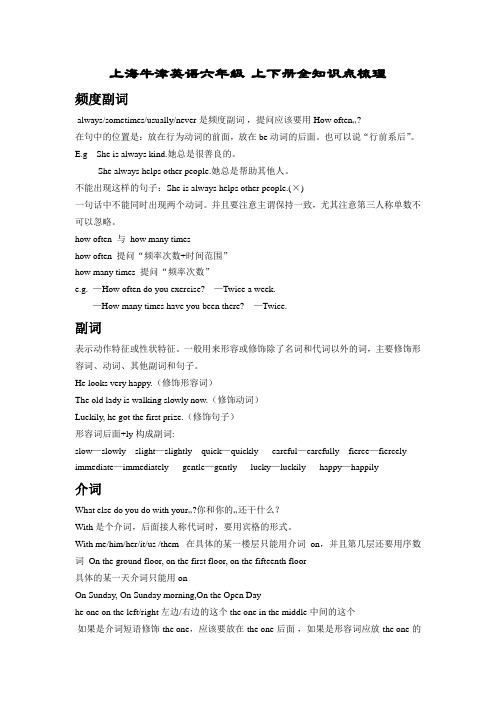
上海牛津英语六年级上下册全知识点梳理频度副词always/sometimes/usually/never 是频度副词,提问应该要用How often…?在句中的位置是:放在行为动词的前面,放在be动词的后面。
也可以说“行前系后”。
E.g She is always kind.她总是很善良的。
She always helps other people.她总是帮助其他人。
不能出现这样的句子:She is always helps other people.(×)一句话中不能同时出现两个动词。
并且要注意主谓保持一致,尤其注意第三人称单数不可以忽略。
how often 与how many timeshow often 提问“频率次数+时间范围”how many times 提问“频率次数”e.g. —How often do you exercise? —Twice a week.—How many times have you been there? —Twice.副词表示动作特征或性状特征。
一般用来形容或修饰除了名词和代词以外的词,主要修饰形容词、动词、其他副词和句子。
He looks very happy.(修饰形容词)The old lady is walking slowly now.(修饰动词)Luckily, he got the first prize.(修饰句子)形容词后面+ly构成副词:slow—slowly slight—slightly quick—quickly careful—carefully fierce—fiercely immediate—immediately gentle—gently lucky—luckily happy—happily介词What else do you do with your…?你和你的…还干什么?With是个介词,后面接人称代词时,要用宾格的形式。
牛津小学英语总复习资料(上海版)

牛津小学英语总复习资料一、大写字母的运用1.句首第一个字母大写。
2.人名、国名、节日名、语言名、组织名等专有名词的首字母大写。
3.星期、月份的首字母大写。
4.特指的学校、政府、党派、委员会或涉及具体人名的称呼或职位,首字母大写。
5.某些特殊词汇、缩略词、标志语、特殊用语等,首字母大写或全大写。
6.句中要强调的部分通常全大写。
7.诗的每一行首字母要大写。
二、与字母发音相同的单词如:Bb-bee, Cc-see/sea, Rr-are, Tt-tea, Ii-I/eye, Oo-oh, Uu-you, Yy-why.三、缩略形式如:I’m = I am, you’re = you are, she’s = she is/she has, won’t=will not, can’t =can not, isn’t=is not, let's = let us.四、同音异形词如:to/too/two, their/there, right/write, pair/pear, four/for, know/no, sun/son.五、反义词如:day-night, come-go, yes-no, up-down, big-small.short-long\tall,fat-thin,low-high, slow-fast,六、名词复数的变化规则1.一般情况下,直接加s,如:book-books, bag-bags, cat-cats, bed-beds.2.以s,x,sh,ch结尾,加es,如:bus-buses, box-boxes, watch-watches.3.以辅音字母加y结尾,变y为i, 再加es,如:family-families,hobby-hobbies.4.以f或fe结尾,变f或fe为v, 再加es,如:thief-thieves, knife-knives.5.以o结尾,加es,如:mango-mangoes.加s,如:radio-radios,photo-photos.6.不规则变化,如:man-men, woman-women, child-children, foot-feet, tooth-teeth.7.不可数名词有:bread, juice, tea, coffee, water, rice等。
最新牛津上海版英语六年级下册全册复习资料
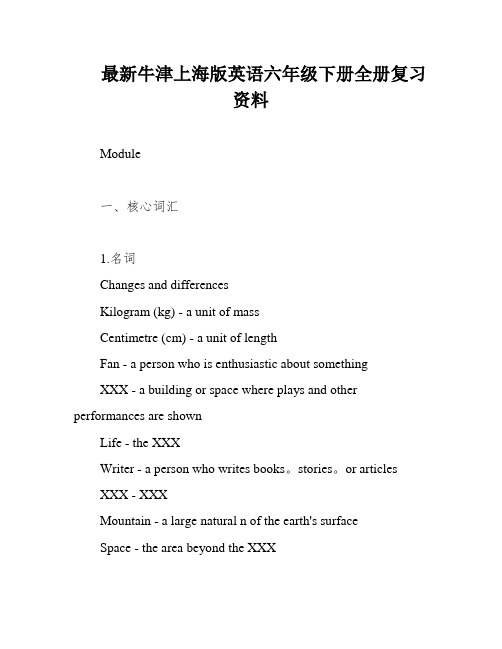
最新牛津上海版英语六年级下册全册复习资料Module一、核心词汇1.名词Changes and differencesKilogram (kg) - a unit of massCentimetre (cm) - a unit of lengthFan - a person who is enthusiastic about somethingXXX - a building or space where plays and other performances are shownLife - the XXXWriter - a person who writes books。
stories。
or articlesXXX - XXXMountain - a large natural n of the earth's surfaceSpace - the area beyond the XXX2.动词Weigh - to determine the weight of somethingDrive - to operate a XXXCarry - to hold or support something while moving3.其他Poor - XXXEven - used to XXX4.短语Street cleaner - a person who cleans the streets二、拓展词汇1.名词Photographer - a person who takes photographsFilm - a XXX flexible strip coated with light-sensitive XXX Broom - a long-XXX sweepingWife - a married womanFairy - XXXPS - postscript。
a note added to the end of a letter after the signatureDinosaur - XXX years ago2.动词Sweep - to clean a surface using a broom3.形容词- extremely goodDigital - XXX4.副词Online - connected to the。
小学英语知识点汇总(沪教牛津版)

基本句型Goodbye 再见Good morning 早上好Good afternoon 下午好I’m…我是…Nice to see you 很高兴看到你Give me …, please 请给我…Here you are 给你This is my…这是我的…What can you do? 你会什么?I can …我会…Can you …? 你会…? Yes, I can. / No, I can’t 是的,我会Who is she/he? 她/他是谁?She’s/He’s …她/他是…May I have a/an …please? 我要…Thank you 谢谢你Can I help you? 我能帮你吗?How many …? 有多少…? There is/are …那儿有…What’s this/that? 这/那是什么?It’s a …它是…Is this/that …? 这是/那是…Yes/No 是的/不是There is a/an …那儿有一个…What color is it? 它是什么颜色?It’s…它是…How are you? 你好吗?I’m fine. Thank you./I’m fine too. 我很好,谢谢!I’m very well. Thank you 我很好,谢谢!I hope that you are too. 我希望你也是what can you see? 你能看到什么I can see …我能看到…Put …in/on …把…放…里/上What’s your name? 你叫什么名字?My name’s …我的名字是…How old are you? 你几岁了?I’m …我…岁Who’s your friend? 谁是你的朋友?Can I help you? 我能帮你吗?How much? 多少钱?什么价格?。
复习资料(知识清单)牛津上海版(三起)英语四年级下册

四年级下册复习资料单词Unit1 touch feel soft hard thickthin hear man noise young blindUnit2 grape straw-berry watermelon juicesmell taste sweet sour or wait minuteget fox round purple thoseUnit3 noon evening night moon shadow high skyagain rise go down him stopunit4 subject lesson Chinese English PE Maths Science from break timetable a.m. p.m. Musicfrom... to...unit5 sport basketball football volleyballtell about club join us together table tennisUnit6 mu-sic guitar violin piano city bag all wonderfulUnit7 time o'clock quarter half start dinner catch washUnit8 Monday Tuesday Wednesday Thursday FridaySaturday Sunday week weekend game after clockUnit9 China Australia Sydney January February MarchAprilMay June July Au-gust September October NovemberDecember live talk wear e-mail computerUnit10 gar-den plant leaf water grow all Seed them Unit11 cinema museum zoo Canada India Thailandsong alsoUnit12 duckling swan duck river ugly baby later back behind away quack into短语at noon/ night go down take a walk from...to... play football/basketball/volleyball play the violin/guitar/pianowash...face brush...teeth get up half past...go to school/bed have breakfast/lunch/dinner play chessat the weekend (be) late for have a party look into swim away well done wait a minute look at句型结构1.对某物进行确认:Is it a/an+可数名词单数?-- Yes, it is. / No, it isn't. Are they/these/those+可数名词复数?---Yes, they are./ No, they aren't.2.选择疑问句:Is it+选项A+or+选项B?---It is s+选项A/选项BAre they+ 选项A+ or+ 选项B ? .-They are+ 选项A/选项B (选项如是名复名词要用复数形式。
2019-2020学年牛津上海版英语(三起)三年级下册全册复习资料

Module Usingmyfivesenses一、核心词汇1.颜色词black黑色的blue蓝色的green绿色的red红色的white白色的yellow黄色的orange橙色的2.食物词candy糖果lemon柠檬icecream冰淇淋3.味觉形容词sour酸的sweet甜的4.交通工具名词bike自行车bus公共汽车plane飞机ship船car小汽车train火车5.动词hear听见listen听6.玩具名词ball球7.疑问词how怎么,怎样8.情态动词can能9.连词and和;同10.其他colour颜色taste味道;尝二、拓展词汇1.颜色词pink粉色的purple紫色的grey灰色的golden金黄色的violet紫罗兰色的2.食物词chocolate巧克力donut甜甜圈mango芒果cherry樱桃pineapple菠萝3.味觉形容词bitter苦的hot辣的salty咸的4.交通工具名词subway地铁taxi出租车raft木筏boat小船jeep吉普truck卡车5.疑问词what什么where哪里who谁whose谁的which哪一个when什么时候why为什么6.情态动词may可能must必须will将要could能够should应该would将要7.连词but但是or或者三、核心句型1.—Whatcolourisyourball?你的球是什么颜色的?—It’sredandwhite.它是红白相间的。
详解:“whatcolour”的意思是“什么颜色”,用来对物品的颜色进行提问。
当主语是单数形式时,be动词用is,答语用“It’s+颜色.”;当主语是复数形式时,be动词用are,答句用“They’re+颜色.”。
举一反三:—Whatcolourisyourpen?你的钢笔是什么颜色的?—It’sblue.它是蓝色的。
—Whatcolouristhepanda?熊猫是什么颜色的?—It’sblackandwhite.它是黑白相间的。
上海版牛津英语重点知识整(横版)精编资料
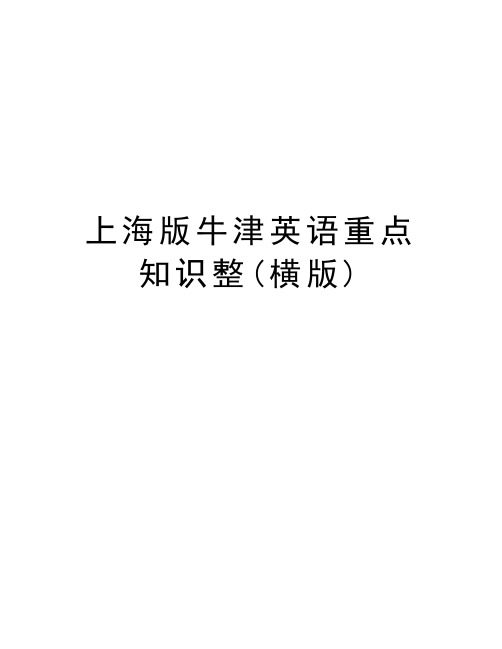
上海版牛津英语重点知识整(横版)上海版牛津英语重点知识整理(1A)仅供学习与交流,如有侵权请联系网站删除谢谢2仅供学习与交流,如有侵权请联系网站删除谢谢3 上海版牛津英语重点知识整理(1B)上海版牛津英语重点知识整理(2A)仅供学习与交流,如有侵权请联系网站删除谢谢4上海版牛津英语重点知识整理(2B)仅供学习与交流,如有侵权请联系网站删除谢谢5仅供学习与交流,如有侵权请联系网站删除谢谢6仅供学习与交流,如有侵权请联系网站删除谢谢7 上海版牛津英语重点知识整理(3A)上海版牛津英语重点知识整理(3B)一仅供学习与交流,如有侵权请联系网站删除谢谢8仅供学习与交流,如有侵权请联系网站删除谢谢9上海版牛津英语重点知识整理(3B)二仅供学习与交流,如有侵权请联系网站删除谢谢10仅供学习与交流,如有侵权请联系网站删除谢谢11 补充知识整理2A sweep ferry belt2B skip umbrella tap towel soap toothpaste spoon thirsty shells3A clap wave bow zebea biscuit shape triange dish ladybird insect root camera3B toothpick spin spinner mirror dill jam joun rough smooth sour peh lizards rainbow violet lorry raindrops pitter patter gloves photograph4A dive engine ambulance below string tape toilet4AM1u1This is my sister.Her name’s Wendy.Good bye!See you.She can run.She can’t cook.仅供学习与交流,如有侵权请联系网站删除谢谢12Can you swim?Yes, I can. /No, I can’t.butM1U2How old are you, Alice?I’m nine.How old is Alice?She’s nine.Happly birthday to you.What’s your name?I’m Ben.Is this your pencil. Kitty.Yes, it’s my pencil.No, it isn’t my pencil.M1U3What are you?What is he/she?What am I?What does your mother do?She’s a dentist.What does your father do?He’s a doctor.Are you a fireman?仅供学习与交流,如有侵权请联系网站删除谢谢13Yes, I’m a fireman.No, I’m not a fireman.M2U1I’m Alice Wang.I’m nine years old.You can call me Alice.Hello, My name is …My hair is short and black.My eyes are long.My nose is big.My mouth is small.My face is round.’s and thatM2U2I have a new skateboard.A ladybird is in the toilet.He is on Ben’s bed.Sam likes your chair.Sam doesn’t like cats.M2U3She has short hair.仅供学习与交流,如有侵权请联系网站删除谢谢14I have a friend.His name’s Mark.We have two friends.The have a cat.Nice to meet you.Whose dog is that?5AM3U1There are two floors.There are forty desks and forty chairs in my classroom. How many girls are there in your class?What time do you go home?I go to school by bus.Peter goes to school by car.M3U2Excuse me.I want a new umbrella.This one’s nice.It’s too small.仅供学习与交流,如有侵权请联系网站删除谢谢15How much money have you got?I’ve got eighty yuan.M3U3Which one means ……Don’t run! It’s dangerous.Which one means ‘Don’t eat’?You can’t play football here.Why not?Look at the sign!M4U1Does it like fruit?Yes, it likes fruit.What colour is the monkey?It is brown.Does it eat sweets?No, it doesn’t eat sweets.Where do monkeys live?It lives in a zoo.Can a monkey swim?Yes, it can.M4U2I don’t know, Kitty.Let’s look at this book.How do you spell that in English?M4U3仅供学习与交流,如有侵权请联系网站删除谢谢16I don’t know this place.Let’s go to the restaurant.三年级起点 3AM1 Getting to know you.Hello, I’m Peter.Good morning, Mr Rabbit.Good morning, Miss Cat.How are you?I’m fine. Thank you.Are you Kitty?Yes, I am.Are you a girl?No, I’m not.M2 My family, my friends and me. This is Kitty.仅供学习与交流,如有侵权请联系网站删除谢谢17She’s thin.Is he Joe?Yes, he is.Is she Mary?No, she isn’t.Who is he?He’s my father.My hair is long.My ears are small.M3 Places and activities.Good afternoon.Close the door, please.How much is it?How much are they?Five yuan.Here you are.This is my bed.These are my books.Is this your pen, Dad?Yes, it is. Thank you, Alice.No, it isn’t.Are these your rulers, Alice?Yes, they are. Thank you, Mum. No, they aren’t.仅供学习与交流,如有侵权请联系网站删除谢谢18M4 The world around us.How many boys?Three boys.What is it?It is a rabbit.In spring, it is warm.仅供学习与交流,如有侵权请联系网站删除谢谢19。
2019-2020学年牛津上海版英语(三起)三年级下册全册复习资料

Module Usingmyfivesenses一、核心词汇1.颜色词black黑色的blue蓝色的green绿色的red红色的white白色的yellow黄色的orange橙色的2.食物词candy糖果lemon柠檬icecream冰淇淋3.味觉形容词sour酸的sweet甜的4.交通工具名词bike自行车bus公共汽车plane飞机ship船car小汽车train火车5.动词hear听见listen听6.玩具名词ball球7.疑问词how怎么,怎样8.情态动词can能9.连词and和;同10.其他colour颜色taste味道;尝二、拓展词汇1.颜色词pink粉色的purple紫色的grey灰色的golden金黄色的violet紫罗兰色的2.食物词chocolate巧克力donut甜甜圈mango芒果cherry樱桃pineapple菠萝3.味觉形容词bitter苦的hot辣的salty咸的4.交通工具名词subway地铁taxi出租车raft木筏boat小船jeep吉普truck卡车5.疑问词what什么where哪里who谁whose谁的which哪一个when什么时候why为什么6.情态动词may可能must必须will将要could能够should应该would将要7.连词but但是or或者三、核心句型1.—Whatcolourisyourball?你的球是什么颜色的?—It’sredandwhite.它是红白相间的。
详解:“whatcolour”的意思是“什么颜色”,用来对物品的颜色进行提问。
当主语是单数形式时,be动词用is,答语用“It’s+颜色.”;当主语是复数形式时,be动词用are,答句用“They’re+颜色.”。
举一反三:—Whatcolourisyourpen?你的钢笔是什么颜色的?—It’sblue.它是蓝色的。
—Whatcolouristhepanda?熊猫是什么颜色的?—It’sblackandwhite.它是黑白相间的。
上海版牛津英语六年级(上下)全重点知识点复习整理

上海版牛津英语六年级(上下)全重点知识点复习整理上海版牛津英语六年级(上、下)全重点知识点复习整理上海牛津英语六年级上下册全知识点梳理频度副词always/sometimes/usually/never是频度副词,提问应该要用howoften??在句中的边线就是:放到犯罪行为动词的前面,放到be动词的后面。
也可以说道“行前系后”。
e.gsheisalwayskind.她总是很正直的。
shealwayshelpsotherpeople.她总是帮助其他人。
不能出现这样的句子:sheisalwayshelpsotherpeople.(×)一句话中无法同时发生两个动词。
并且必须特别注意主谓保持一致,尤其特别注意第三人称单数不可以忽略。
howoften与howmanytimeshowoften回答“频率次数+时间范围”howmanytimes回答“频率次数”e.g.―howoftendoyouexercise?―twiceaweek.―howmanytimeshaveyoubeenthere?―twice.副词则表示动作特征或性状特征。
通常用以形容或润色除了名词和代词以外的词,主要润色形容词、动词、其他副词和句子。
helooksveryhappy.(润色形容词)theoldladyiswalkingslowlynow.(修饰动词)luckily,hegotthefirstprize.(修饰句子)形容词后面+ly构成副词:slow―slowlyslight―slightlyquick―quicklycareful―carefullyfierce―fiercelyim mediate―immediatelygentle―gentlylucky―luckilyhappy―happily介词whatelsedoyoudowithyour??你和你的?还干什么?with就是个介词,后面直奔人称代词时,必须用宾格的形式。
(完整版)上海版牛津英语重点知识整(横版).doc
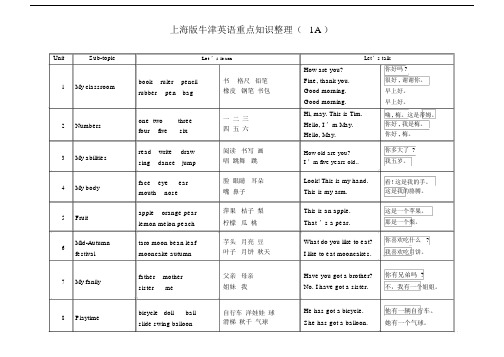
上海版牛津英语重点知识整理(1A )Unit Sub-topic Let ’s learn Let’s talk1 My classroom book ruler pencil rubber pen bag2 Numbers one two three four five six3 My abilities read write draw sing dance jump4 My body face eye ear mouth nose5 Fruit apple orange pear lemon melon peach6 Mid-Autumn taro moon bean leaf festival mooncake autumn7 My fanily father mother sister me8 Playtime bicycle doll ballslide swing balloon书格尺铅笔橡皮钢笔书包一二三四五六阅读书写画唱跳舞跳脸眼睛耳朵嘴鼻子萍果桔子梨柠檬瓜桃芋头月亮豆叶子月饼秋天父亲母亲姐妹我自行车洋娃娃球滑梯秋千气球How are you?Fine, thank you.Good morning.Good morning.Hi, may. This is Tim.Hello, I ’m May.Hello, May.How old are you?I ’m five years old..Look! This is my hand.This is my arm.This is an apple.That ’s a pear.What do you like to eat?I like to eat mooncakes.Have you got a brother?No. I have got a sister.He has got a bicycle.She has got a balloon.你好吗 ?很好 , 谢谢你。
沪教版牛津小学英语总复习资料

沪教版牛津小学英语总复习资料5A M1U1单词:Traffic light Stop!Wait! Go! Cross Don’t cross Don’t run!Don’t leave rubbish Don’t open the window felt pen glue paper tapea pair of scissors句子:P2课文:In the streetLook! The traffic light’s red. Stop! The traffic light’s yellow. Wait! The traffic light’s green. Go!P3课文:In the streetLook! There’s the red man.Don’t cross the road.There’s the green man.Cross the road.M1U2 At homeCan I go out ? No, you ca n’t. Look! it’s raining.Can we watch television? Yes, you can.Can I have some sweets? No, you can’t, it’s dinner time.Can I have some juice? Yes, you can. Here you are.P4课文:Don’t run!Don’t make a noise!Don’t leave rubbish!Don’t open the window!P6课文:1: What do you want ?I want some paper and felt pens/......please.Talk about(Kitty) wants... (Alice) wants... (Eddie) wants... (Danny) wants...单词:felt pen glue paper tape a pair of scissorsM1U3What do you need ( for school)? I need (a new uniform). /……I need some new shoes.What have we got? We’ve got some papers /……(glue ),but we need some flour/……(milk)单词: Sugar butter flour eggs milk salt jam a bowl a spoon M2U1Hi! I’m Ben. I get up at six o’clock. /……I go to school at seven o’clock. /……Ben gets up at six o’clock. /……He goes to school at seven o’clock. /……What time do you get up?At seven o’clock in the evening. /……M 2U 2 what do you like? Unit3 A birthday party单词:sausages(香肠) carrots(胡萝卜) cabbage(白菜)句型练习:What do you like? What don’t you like? I like……,but I don’t like……He/She likes……,but she /he doesn’t like……Is Kitty hungry or full? Kitty is hungry.Is Peter sick or happy? Peter is sick today.Do you want a sandwiches? A sandwich, please. I like sandwiches.Which bicycle do you like? The……颜色one.When ’s your birthday?My birthday’s on the…日of….月Module 3 Unit 1 My schoolI go to school by school bus.Kitty goes to school by school bus/by car/by taxi/by underground/by tram/on foot.I walk. Betty walks to school.How many floors are there in your school?How many classrooms are there in your school?How many children are there in your school?How many girls/boys are there in your class?How many desks/chairs/fans/windows/blackboards/cupboards/doors are there in your classroom?There are …Un i t 2 Let’s go shopping!I want a ... This one’s...That one’s...How much money have you got? I‘ve got...yuan.How much is that...? It’s...yuan.Unit 3 Follow the signs!Don’t run! 禁止跑步Don’t jump in to the pool! 禁止跳进池子Don’t play ball games! 禁止玩球类游戏Don’t eat!禁止吃东西M4 U1In the jungle I can swim/… Can a monkey swim/… ? Yes , it can./ No, it can’t . Crocodile zoo-keeperM4Unit2 ButterfiesWhat’s this/that?It’s a cocoon.How do you spell that in English? C-o-c-o-o-n.Which one do you like?I like the green and blue one, but I don’t like the black and purple one.单词:cocoon spell lay become caterpillarM4U3Can we see the dolphins?Yes, let’s go to the Ocean Theatre. We can see the dalphinsthere.Can we see the fish? Yes. Let’s go to the Fish Aquarium. We can see the fish there.That’s the Li River. It’s in Guilin.That’s Sanya. It’s on Hainan lsland.单词:Aquarium Restaurant Pool Theatre House map place dolphin seal island tower5B Module1 Unit 1 Use your eyes!Behind the mountain in the morning block’s shadow behind the blockIn the shy in the afternoon beside the block goes down in the eveningIn front of the blockI can’t see …… where is it? It’s/they’re behind/inside …Have you got any…? Yes,I’ve got some… I can’t see. Where are they?They’re…the…Inside the box outside the box behind in front of besideM1 Unit 2 Use your ears!Do you want both …,…? No,the …one,please.Long/short round/square full/empty big/small red/green biscuits pencils Ice-creams bottles cakesM1 Unit 3 Use your hands!Whose pencil case is this?it s mine.Whose bags are these?They re ours.M1 Unit 4 Use your five senses!I listen and hear with my ears. I smell with my nose. I look and see with my eyes.I touch and feel with my hands. I taste with my tongue.He/she can… .Are they the same or different?They’ re same /different.M2 Unit 1 Animals in the zooWhat time do you feed the elephants? I feed them at half past eight in the morning.What do the elephants eat? They eat hay.How much hay do they eat? They eat 50 kilos of hay.When do you clean their cage? I clean their cage at half past six in the morning. Where are the tigers? Go down the steps. Cross the small road.Walk up the steps. Walk along zoo road.Cross park road. The tigers are on the left.单词Left right up down along elephants tigers monkeys giraffes lions plant houses birds parrotsAt the top of the houseM2 Unit 2 Favourite toysWhich…do you like? I like both / all the...Pandas dinosaurs kites bicycles cars bears soldiers robots computers(用于造句)What colour are the…? Both/All the … are…the cars the balls the kites the robots the toy soldiers thebicycles(用于造句)Module2 Unit 3 At homeWhere’s Sam? He was here at ten o’clock. He was here at ha lf past ten. 单词:lamp 台灯shelf 架子mirror镜子picture 图片sofa 沙发Module 3 Unit 1whose bird is this?No,it’s not mine. Mine is black.Is it Grandpa Cai’s? No,it’s not his.His is blue.Is it Mrs Chen’s? No,it’s not hers.Hers is yellow.Is it Mr and Mrs Wang’s? No,it’s not theirs.Theirs is green.Is it yours,Mr and Mrs Li? No,it’s not ours.Ours is brow n.It’s Mr Tang’s.Is it yours,Mr Tang? Yes,it’s mine.The sea was green. Now it’s blue.The a pples were green. Now they’re red.Module 3 Things around us Unit 2It is five past one. It is ten past one. It is twenty past one. It is twenty-five past one.It is twenty-five to two. It is twenty to two. It is ten to two. It is five to two. What time is it? It’s five past one. What time is it? It’s…注意时间的表达,半点或半点以前用past,半点以后用to.Module 3 Unit 3 What is the weather like?What′s the weather like? It’s rainy ... l like the rain and the wind. I don’t like the rain天气类单词:sunny cloudy rainy windy cool dry wet hot cold warm temperature degrees6A M1 U1My name is Alice. These are my family and relatives.This is my grandfather. This is my grandmother. This is my...These are my brothers.How many brothers do you have ? I only have one uncle(家庭成员/I have three(数字).What do you do with your aunt? I usually go shopping with my aunt.What else do you do with her? I sometimes play badminton with her.M1 U2They like to play together.He is always friend.They always walks to school together.He never works hard.Have you been there yet?Yes , I ha ve just been there./No, I haven’t been there.M1 U3What do you usually do at weekends?I usually go shopping in Wangfujing Street.Is wangfujing Street…near or far away from Tiananmen Square…?It’s near/far away from Tiananmen Square.Where have you been (in Beijing)? I have been to Tiananmen Square.How are we going to get there? Let’s go by bus.When are we going to come back? We are going to come back at six o’clock. Which place shall we visit? Let’s go to the Great Wall.How much does it cost? Twenty yuan.How/What about nine o’clock in the morning?Yes, that’s a good time.M2 U1Would you like to be a policeman? Yes , I would./ No, I wouldn’t.Why?/Why not? Because I want to make our city a safe place./don’t like cooking. What would you like to be? I would (‘d) like to be a postman.M2 U2What will they do? They'll visit our classroom.[...]Where will kitty[...] be? She'll be in the library.Where is it? It's on the second[...] floor.M2U3Do you live near or far away from school? I live near\far away from school.How do you go to school? I go to school by bus[...]/on foot.How does kitty[...] go to school? She goes to school by bus/on foot.How long does it take you to get to the park?It takes about twenty minutes. What does he/she see when he/she is on the bus?He/She sees a lot of students when he/she is on the bus.M2U4Don’t turn left.禁止左拐Don ’t walk on the grass. 禁止在草地上走Don’t climb the trees. 禁止爬树Don’t enter. 禁止进入Don’t ru n. 禁止跑Don’t eat or drink. 禁止吃或喝Don’t leave rubbish. 禁止扔垃圾Don’t talk loudly. 禁止大声说话Don’t play ball games.禁止玩球类游戏Where do we have rules? We have rules in the classroom...What does this sign mean? We must listen to our teacher.Where can we find it? We can find it in a library.M3U1How much was it? It was ten yuan.How much were they? They were twenty-five yuan.What would you like for dinner? I’d like some rice. (I’d like noodles.) What kind of soup would yo u like? I’d like chicken soup.Have you bought any prawns? Yes, I have.Where did you buy it? In the supermarket.M3U2Why do you like oranges? Because they are sweet.Why don’t like spicy sausages? Because they’re too spicy.Shall we buy some apple juice? Yes, like/No, l don’t likeapple juice.What would you like? I’d like some bread.Would you like some chicken wings? Yes, please/ No, thanks.May l have some pears, please? OK. Here you are.M3U3How much sugar do we need every day? We need a little sugar every day.What do you usually have for breakfast? I usually have bread and milk.Your diet is healthier than my diet.Your diet less healthy than my diet.Your diet is as healthy as my diet.6B M1U1Look at the map. Beijing is the capital of China. Which city is the capital of Japan? T okyo is the capital of Japan.That’s right. Where is it?It’s north_ east of the shanghai.How far is it from shanghai to Beijing? It’s about 1400 kilometres.How can we travel to Beijing? We can travel by train.How long does it take to travel from Shanghai to Beijing by train? It takes about ten hours.M1 U2What time does your plane leave for Los Angeles tomorrow?At three o’clock in the afternoon/morning/evening.How long does it take to travel to the airport?It takes about one and a half hours.What time should we arrive at the airport?We should arrive at the airport before one o’clock in the morning/afternoon/evening?Don’t worry.M1 U3Do you like rice dumplings?I like salty rice dumpligs with meat,but I don't like sweet rice dumplings with beans.Would you like some rice dumplings. Yes, please. I like rice dumplings. /No, thanks.I don't like rice dumplings. I'd rather have a piece of pizza.What's your favourite indoor activity? I like doing puzzles at home.Why do I always have a headache? It's because you watch too much television. What should I do? You should watch less television.M2 U1This is me in 15 years ’time. I’ll be taller and heavier. I’ll be 165 centimetres tall. I’ll weigh 55 kilograms.I’ll be more beautiful. I’ll be an astronaut.What will Jill be like in 15 years' time? She will be tall and slim.She’ll be 168 centimetres tall./weigh 52 kilograms.What will Jill possibly be in 15 yea rs’ time? She will possibly be a singer/an astronaut .Yes ,I agree./No, I don’t agree.What would you like to be? I would you like to be a doctor.I’m good at Chinese./I’m poor at Maths.I have to practise English and Maths more. I learn how to make sick people better. M2 U2Many students like studying in the library because it is air- conditioned.Not many students playing in the playground because it is hot.Why do many students (not) like studying in the library?playing in the playground?Because it is air-conditioned.it is hot.Boy must wear white shirts with the short sleeves.M2 U3In the past, all passengers had to buy tickets from a bus conductor.there were only single-decker buses.Nowadays ,passengers put their money in a fare box.some buses are double-decker buses.What will travelling in Garden City be like in 10 years` time?Perhaps(all/most/some/none)of the people will travel by(underground /taxi/ plane /bus)Perhaps there will be more underground stations.fewer traffic jams.M3 U1What can you see when there is a gentle wind/a strong wind?I can see people flying kites./clouds moving quickly.What may happen there is a typhoon? A strong wind may break windows.M3 U2If there is no rain, we will have no water to drink./The crops and vegetables will die.What do we use water to do? We use water to brush our teeth.How can we save water? We can save water by fixing a dripping tap./not playing water games.最高级the largest/most intelligent/most dangerous……M3 U3We get wood from trees.What can we use glass to make? We can use glass to make bottles.How does if feel? It’s hard and rough(soft/smooth).W hat is it made of? It’s made of wood.What is it? It’s a wooden box(plastic bag/woolen scarf/cotton T-shirt/glass bottle).疑问词:What what time when how how many how much how old how far how long Which where why人称代词主格:I we you he she it they人称代词宾格:me us you him her it them名词性物主代词Mine yours hers his theirs ours形容词性物主代词My your her his their our职业类单词:job 工作;职业secretary 秘书bank clerk 银行职员policewoman(man) 女(男)警察dentist 牙医driver 司机doctor医生nurse 护士worker工人shop assistant售货员pilot 飞行员fireman 消防员postman邮递员teacher 老师singer歌手cook 厨师astronaut宇航员介词:beside 在…旁边behind 在…后面above 在…上方between 在…之间on 在…上面in在…里under 在…下面near 在…附近in front of 在…前面感觉类单词fluffy smooth shiny rough cold hard warm soft hot颜色类词语:red(红色)orange(橙色)yellow(黄色) green(绿色) blue(蓝色) black(黑色)purple(紫色)white(白色) pink(粉色)brown(棕色)基数词: 11eleven 12 twelve 20 twenty 13 thirteen 30 thirty 14 fourteen 40 forty 15fifteen 50fifty 16sixteen 60sixty 17seventeen 70seventy18eighteen 80 eighty 19 nineteen 90ninety 100 one hundred 序数词:first 第一second 第二third第三fourth 第四fifth第五sixth 第六seventh 第七eighth 第八ninth 第九tenth 第十eleventh第十一twelfth 第十二thirteenth 第十三fourteenth 第十四fifteenth 第十五sixteenth 第十六seventeenth 第十七eighteenth 第十八nineteenth 第十九twentieth 第二十twenty-first第二十一twenty-second第二十二twenty-third第二十三twenty-fourth第二十四twenty-fifth第二十五twenty-sixth第二十六twenty-seventh第二十七twenty-eighth第二十八twenty-ninth第二十九thirtieth 第三十thirty-first 第三十一月份:January一月February二月March三月April四月May 五月June 六月July 七月August八月September九月October十月November十一月December十二月副词总结gently fiercely slightly quickly slowly carefully happily亚洲国家及首都:Asia Japan Thailand China Bangkok Tokyo 方向:North-west north-east south-east south-west重点短语:from …to … ; … of … ; like/enjoy/love doing ; in Beijing… ; plenty of ; a lot of ; lots of ; live in Yangquan… ; in May … ; in 10 years’ time ; in the morning … ; in the playgrou nd ; in the room(…); for six years… ; arrive at … ; at half past six(…) ; on the first of April(具体日期);on that day; on the Earth(oceans) ; jump into ; all/most/some/none o f … ; cut down ; make … ; with…(和…一起;带有…); after that ; on the first/…floor表数量的词组:a few a little lots of a lot of plenty of。
完整版级英语下册知识点总结牛津上海版(一)
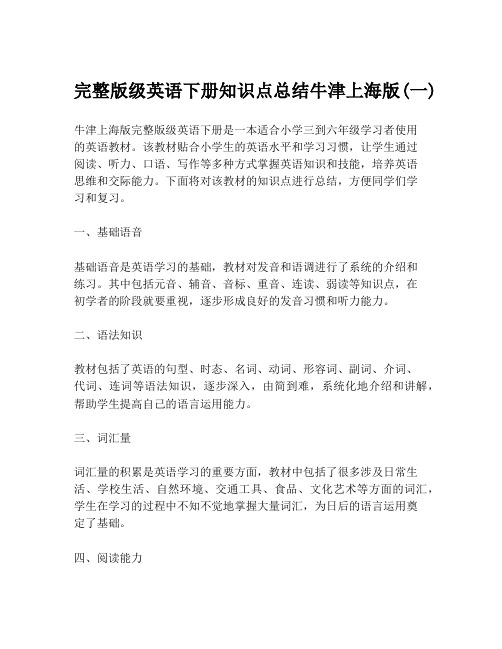
完整版级英语下册知识点总结牛津上海版(一)牛津上海版完整版级英语下册是一本适合小学三到六年级学习者使用的英语教材。
该教材贴合小学生的英语水平和学习习惯,让学生通过阅读、听力、口语、写作等多种方式掌握英语知识和技能,培养英语思维和交际能力。
下面将对该教材的知识点进行总结,方便同学们学习和复习。
一、基础语音基础语音是英语学习的基础,教材对发音和语调进行了系统的介绍和练习。
其中包括元音、辅音、音标、重音、连读、弱读等知识点,在初学者的阶段就要重视,逐步形成良好的发音习惯和听力能力。
二、语法知识教材包括了英语的句型、时态、名词、动词、形容词、副词、介词、代词、连词等语法知识,逐步深入,由简到难,系统化地介绍和讲解,帮助学生提高自己的语言运用能力。
三、词汇量词汇量的积累是英语学习的重要方面,教材中包括了很多涉及日常生活、学校生活、自然环境、交通工具、食品、文化艺术等方面的词汇,学生在学习的过程中不知不觉地掌握大量词汇,为日后的语言运用奠定了基础。
四、阅读能力阅读是学习英语的重要手段,教材中不仅有精选的篇章和读物,还包括了朗读、阅读理解、语篇分析等多个方面的知识点,帮助学生提高自己的阅读能力,培养英语思维和理解能力。
五、口语表达口语表达是英语学习最终的目的,教材中注重提高学生的口语表达能力,从基本句型、口语习惯、口头表达技巧等方面进行讲解和练习,帮助学生在真实的语境中进行口语交际。
六、写作技巧写作是英语学习的另一个方面,教材中包括了各种写作形式的知识点和技巧,如日记、便条、卡片、作文等,帮助学生提高英语写作能力,表达自己的思想和观点,增强英语交际能力和文化素养。
综上所述,牛津上海版完整版级英语下册是一本综合性的英语教材,通过基础语音、语法知识、词汇量、阅读能力、口语表达和写作技巧等知识点的系统介绍和讲解,帮助学生在全面提高自己英语能力的同时,还能享受到学习英语的乐趣。
上海版六年级上牛津总复习

6A M1U1 Family and RelativesI. New W ords:1.family tree n.家谱 a family tree 一个家谱2.uncle n.叔,伯,舅,姑夫,姨父3.aunt n.姑,姨,婶,伯母,舅母4.cousin n.堂(表)兄弟,堂(表)姐妹5.daughter n.女儿6.granddaughter n.孙女,外孙女7.nephew n.侄子;外甥8.niece n. 侄女;外甥女9.grandson n.孙子,外孙10.present n.礼物=gift a lot of (=many) presents 许多礼物11.birthday cards 生日卡片12.make (a birthday card) for sb 为某人制作一张生日卡片13.get sth from sb 从某人那里得到某物14.pair n.一对,一双 in pairs 成对地,成双地15.decide to do sth v.(动词)决定,下决心做…16.only ad.(副词)仅仅17.member n.成员,会员 one of my family member s我的一个家庭成员18.one of my classmates 我的一个同学考点:one of + n.pl (名词复数) 其中一个…19.How many uncles do you have? 你有几个叔叔?考点:How many + 可数n.plplete v.= finish 完成,结束21.classmate n.同班同学talk to a classmate 和一个同学对话22.like prep(介词) 像,和…一样 / v. 喜欢23.What do you do with sb(宾格)? 和某人做些什么事?24.shop v.购物go shopping 去购物25.else ad.别的,其他的What else do you do with sb? 和某人还做些什么事?26.badminton n.羽毛球play badminton 打羽毛球27.activity n. 活动28.cycle v.骑自行车go cycling 去骑自行车29.always ad.总是,一直ually ad.通常,经常31.sometimes ad.有时32.play games 做游戏33.swim v.游泳go swimming 去游泳34.restaurant n.饭馆,饭店go to a restaurant去一家饭店35.watch / see a film 看电影36.go to the cinema 去电影院II. Different forms of the words1.relative n(名词).亲戚,亲属→ pl.(复数)relatives 亲戚们2.photo n. 照片 pl: photos3.decide v.(动词)决定,下决心→ decision n.决定4.bicycle n.自行车→ cycle v.骑自行车6A M1U2 I have a good friendI. New W ords:37.poem n.诗 read a poem 念一首诗38.not … at all 一点也不39.like to play 喜欢玩like to do 喜欢做(此时喜欢,一次性地)like doing 喜欢做(习惯性地,经常地)40.go to the park 去公园41.every day 每天区别:everyday a.每日的,日常的42.not… or… 不…和… She ca n’t read or write.她不会读和写。
上海版牛津英语六年级第二学期期末复习资料
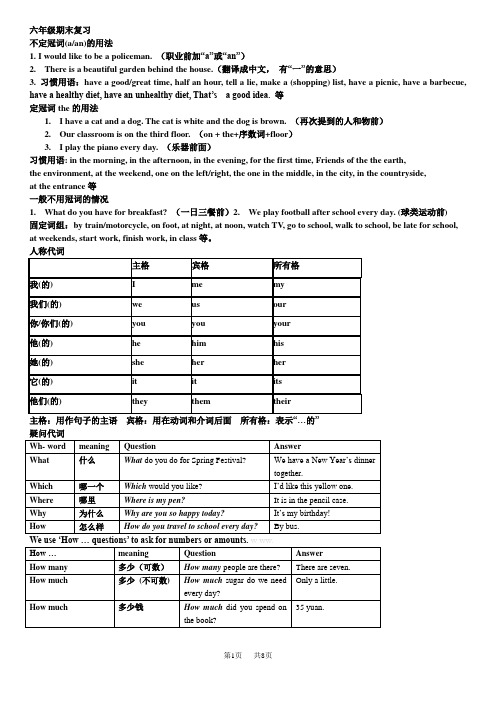
六年级期末复习不定冠词(a/an)的用法1. I would like to be a policeman. (职业前加“a”或“an”)2.There is a beautiful garden behind the house.(翻译成中文,有“一”的意思)3. 习惯用语:have a good/great time, half an hour, tell a lie, make a (shopping) list, have a picnic, have a barbecue, have a healthy diet, have an unhealthy diet, That’s a good idea. 等定冠词the的用法1.I have a cat and a dog. The cat is white and the dog is brown. (再次提到的人和物前)2.Our classroom is on the third floor. (on + the+序数词+floor)3.I play the piano every day. (乐器前面)习惯用语: in the morning, in the afternoon, in the evening, for the first time, Friends of the the earth,the environment, at the weekend, one on the left/right, the one in the middle, in the city, in the countryside,at the entrance等一般不用冠词的情况1.What do you have for breakfast? (一日三餐前)2. We play football after school every day. (球类运动前)固定词组:by train/motorcycle, on foot, at night, at noon, watch TV, go to school, walk to school, be late for school, at weekends, start work, finish work, in class等。
- 1、下载文档前请自行甄别文档内容的完整性,平台不提供额外的编辑、内容补充、找答案等附加服务。
- 2、"仅部分预览"的文档,不可在线预览部分如存在完整性等问题,可反馈申请退款(可完整预览的文档不适用该条件!)。
- 3、如文档侵犯您的权益,请联系客服反馈,我们会尽快为您处理(人工客服工作时间:9:00-18:30)。
牛津小学英语总复习资料一、大写字母的运用1.句首第一个字母大写。
2.人名、国名、节日名、语言名、组织名等专有名词的首字母大写。
3.星期、月份的首字母大写。
4.特指的学校、政府、党派、委员会或涉及具体人名的称呼或职位,首字母大写。
5.某些特殊词汇、缩略词、标志语、特殊用语等,首字母大写或全大写。
6.句中要强调的部分通常全大写。
7.诗的每一行首字母要大写。
二、与字母发音相同的单词如:Bb-bee, Cc-see/sea, Rr-are, Tt-tea, Ii-I/eye, Oo-oh, Uu-you, Yy-why.三、缩略形式如:I’m = I am, you’re = you are, she’s = she is/she has, won’t=will not, can’t =can not, isn’t=is not, let's = let us.四、同音异形词如:to/too/two, their/there, right/write, pair/pear, four/for, know/no, sun/son.五、反义词如:day-night, come-go, yes-no, up-down, big-small.short-long\tall,fat-thin,low-high, slow-fast,六、名词复数的变化规则1.一般情况下,直接加s,如:book-books, bag-bags, cat-cats, bed-beds.2.以s,x,sh,ch结尾,加es,如:bus-buses, box-boxes, watch-watches.3.以辅音字母加y结尾,变y为i, 再加es,如:family-families,hobby-hobbies.4.以f或fe结尾,变f或fe为v, 再加es,如:thief-thieves, knife-knives.5.以o结尾,加es,如:mango-mangoes.加s,如:radio-radios,photo-photos.6.不规则变化,如:man-men, woman-women, child-children, foot-feet, tooth-teeth.7.不可数名词有:bread, juice, tea, coffee, water, rice等。
(不可数名词相对应的be动词是is/was)七、名词所有格表示人或物品所属关系时,就需要使用名词所有格。
名词所有格的构成有以下规则:1.一般情况下,在名词的末尾加’s构成。
如:Tom’s book2.以“-s”结尾的复数名词的所有格,只在其末尾加’。
如:our teachers’ books3.表示几个人共同拥有的东西时,只在最后一个名字上加所有格。
如:Su Hai and Su Yang’s bedroom八、a, an和the的用法1.单词或字母的第一个读音是辅音读音:a book, a peac h, a “U”.单词或字母的第一个读音是元音读音:an egg, an hour, an “F”.2.the要注意的:球类前面不加the,乐器前面要加the,序数词前面要加the。
九、人称代词和物主代词人称代词:1.人称代词分为第一、第二、第三人称,且有单复数之分。
2.人称代词的主格在句中做主语,一般用在动词前(疑问句除外)。
3.人称代词的宾格在句中做宾语,多用于动词、介词后。
4.人称代词能代替表示人称的名词。
物主代词:1.表示所有关系的代词叫做物主代词。
2.物主代词分为形容词性物主代词和名词性物主代词。
物主代词也有人称和数的变化。
3.形容词性物主代词起形容词的作用,后面一定要跟名词,表示该名词所代表的事物是属于谁的。
4.名词性物主代词=形容词性物主代词+名词。
如:This is my bag.= This is mine. 熟记人称代词和物主代词的绕口令:我是" I " ,你是“you","he, she, it" 他,她,它"我的“my”,你的"your",他的"his", 她的"her"十、形容词、副词的比较级1.形容词的比较级:用于两者的比较。
(1)基本句式的构成:A(主格)+ be + 形容词的比较级 + than + B(宾格).(2)表示一样的情况时用原级,结构是:as + 原级 + as2.副词的比较级:(1)基本句式的构成:A(主格)+ 动词 + 副词的比较级 + than + B(宾格).(2)表示一样的情况时用原级,结构是:as + 原级 + as3.形容词、副词比较级的变化规则:(1)单音节词末尾加er;(2)单音节词如果以字母e 结尾,加r;(3)重读闭音节词如果末尾只有一个辅音字母,须双写这个字母,再加er;(4)以辅音字母加y结尾,变y为i,再加er;(5)双音节和多音节词的比较级在原级前加more;(6)不规则变化, 如:well-better, much/many-more。
十一、基数词和序数词1.one--first, two--second, three--third, five--fifth, nine--ninth,twelve--twelfth, twenty-twentieth, forty-one--forty-first.序数词前一定要加the。
2.基数词变成序数词的方法:(1)直接在基数词词尾加上th,如:seventh第七,tenth 第十,thirteenth 第十三;(2)以y结尾的基数词,变y为ie,再加上th,如:twentieth 第二十。
(3)不规则变化,如:first 第一, second 第二, third 第三,fifth 第五,eighth 第八,ninth 第九,twelfth 第十二。
(4)基数词“几十几”变为序数词时,表示“几十”的基数词不变,只把表示“几”的基数词变成序数词,如twenty-first 第二十一。
3.序数词的缩略形式是由阿拉伯数字和序数词的最后两个字母构成的,如:1st, 2nd, 3rd, 4th。
十二、be动词(am, is, are)1.口诀:我用am, 你用are, is用在他她它,复数全用are。
2.否定形式:am not(没有缩写形式), is not=isn’t, are not=aren’t。
3.过去式:am/is(was), are(were)。
十三、情态动词(can,must,could,would,may,shall,should)1.情态动词后面用动词原形。
2.其否定形式是在情态动词的后面加not。
十四、助动词(do, does, did)1.do, does用于一般现在时,does用于第三人称单数,其余一律用do。
2.did用于一般过去时。
3.它们的否定形式为:do not=d on’t, does not=doesn’t. did not=didn’t.十五、介词in的用法:1.用在某范围或某空间内,如:in the desk2.在一段时间内,如:in the morning3.以,用……方式,如:in Englishin和on的区别:树上长出来的用on,不是树上长出来的则用in。
in, on, at的区别:in, on, at都可以用来放在时间前面,但是in后面一般是morning,afternoon,evening,月份、年份、季节或者指某一段时间内;on用在具体某一天,如:on Sunday morning;at一般用在某个假期期间(不是指具体的某一天),它还可以用在具体的时间,如:at Spring Festival, at five o’clock.小学英语教材中出现的介词有:in, on, from, of, by, about, for, under, behind, after, before, with, near, off, at, to, around, nearby等。
十六、特殊疑问词十七、there be结构与have, has的区别there be结构:1.there be结构表示“某地存在着什么事物或人”。
在一般现在时中,there be结构应该用there is 或there are 表示;在一般过去时中,there be结构则应该用there was或there were表示。
2.主语是不可数名词或单数可数名词时用is(was),是复数时用are(were)。
3.there be结构遵循就近原则。
4.在陈述句中为了强调地点,可将介词短语提到句首。
5.否定句:在be动词后面加not,如果句中有some,要变成any。
6.一般疑问句:把be动词提到句首,首字母大写,句尾改成问号。
7.What is + 地点介词短语?(无论主语是单数还是复数都用is)there be结构与have, has的区别:there be 表示某地存在着什么事物或人;have(has) 表示某物或人拥有某物。
十八、现在进行时1.现在进行时表示现在正在进行或发生的动作。
常与now连用,当句首有look, listen时,也用现在进行时。
2.现在进行时肯定句的基本结构为:主语+ be动词+动词的现在分词(doing,即动词的ing形式)(1)其中be动词随着主语的变化而变化,be动词包括am, is, are。
(2)动词现在分词的变化规则:A 一般情况下,直接在动词后加ing,如:cook-cooking.B 以不发音的e结尾的动词,去掉e后加ing,如:make-making, dance-dancing.C 以重读闭音节结尾的动词,双写末尾字母后加ing, 如:run-running,swim-swimming.D 以ie结尾的动词,变ie为y,再加ing, 如:lie-lying, die-dying.3.现在进行时的否定句:在be动词后面加not。
4.现在进行时的一般疑问句:把be动词提到句首,首字母大写,句尾改成问号。
十九、一般现在时1.一般现在时表示一般情况下经常发生的动作或存在的状态。
常与 usually, sometimes, often, always等词连用。
2.一般现在时的谓语动词为be动词时,be的变化遵循“我用am, 你用are, is 用在他她它,复数全用are”的规律。
3.一般现在时的谓语动词为其它动词时,当主语为第三人称单数时,动词要用第三人称单数形式。
如:Mary likes Chinese.玛丽喜欢汉语。
4.动词第三人称单数的变化规则:(1)一般的动词,直接在词尾加s,如:cook-cooks, like-likes.(2)以s,x,sh,ch,o等结尾的动词,加es,如:wash-washes, watch-watches, go-goes, do-does.(3)以辅音字母加y结尾的动词,变y为i, 再加es,如:study-studies.(4)不规则变化,如:have-has.5.一般现在时的变化:(1)be动词的变化。
